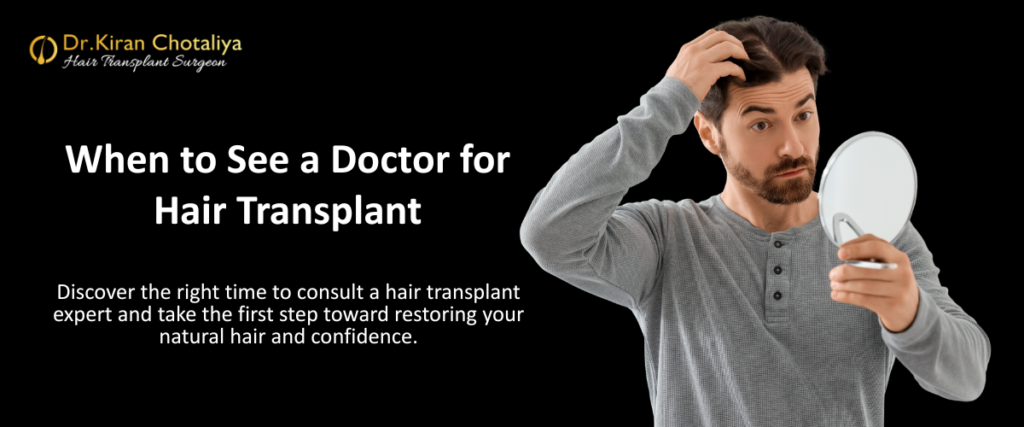
Hair loss is a common concern for both men and women. While mild hair thinning can often be managed with home remedies or topical treatments, there comes a stage when professional help becomes essential. If you are noticing excessive hair fall, receding hairlines, or visible bald patches, it might be the right time to consult a hair transplant surgeon in Pune for expert evaluation and treatment.
Here’s how to identify when it’s time to see a doctor for a hair transplant.
If your hairline continues to recede or bald spots are becoming larger despite trying various products or medications, it’s a sign your hair loss is progressing. Consulting an experienced hair transplant surgeon in Pune, like Dr. Kiran Chotaliya, will help you understand the cause and explore permanent restoration options.
Many people try solutions like Minoxidil, PRP therapy, or dietary supplements to manage hair loss. But when these treatments fail to deliver visible results, it’s time to consider a more effective and lasting approach — a hair transplant. A consultation with a qualified hair transplant surgeon in Pune can help determine if you are an ideal candidate for the procedure.
Thinning hair or bald patches can have a strong emotional impact. If hair loss is affecting your self-image or confidence in personal or professional life, a hair transplant can help restore your natural look and self-assurance.
Dr. Kiran Chotaliya, a renowned hair transplant surgeon in Pune, focuses on delivering results that look completely natural and match your facial aesthetics.
A hair transplant works best when hair loss has stabilized — meaning you’re not losing large amounts of hair suddenly. At this stage, the doctor can accurately plan graft placement, ensuring balanced and long-lasting results. Dr. Kiran Chotaliya uses advanced FUE and FUT techniques to provide dense and natural-looking outcomes.
If you’ve been struggling with hair loss for years and want a permanent, scientifically proven solution, it’s the right time to consult a professional. A hair transplant not only restores your hair but also your confidence and personality.
Dr. Kiran Chotaliya is a distinguished expert in the fields of Hair Transplant Surgery, Cosmetology, Dermatology, and Dermato-surgery. With years of dedicated practice and a commitment to staying at the forefront of medical advancements, Dr. Chotaliya offers unparalleled expertise and compassionate care. Patients seeking treatments for hair loss, skin conditions, and cosmetic enhancements can trust in his comprehensive approach and meticulous attention to detail. Dr. Chotaliya’s practice is synonymous with excellence, ensuring each patient receives personalized care tailored to their unique needs and goals.
Expertise
Hair Transplant Surgery, Cosmetology, Dermatology, Dermato-surgery

Recognizing the right time to see a hair transplant doctor can make all the difference between temporary solutions and lasting results. If your hair loss is getting worse, or if you’ve lost confidence due to baldness, don’t delay professional consultation. Meet Dr. Kiran Chotaliya, one of the best hair transplant surgeons in Pune, at Hair Free Hair Grow Clinic and take the first step toward a confident, rejuvenated you.
Don’t let hair loss affect your confidence—take the first step toward hair restoration today! Book a one-on-one consultation with Dr. Kiran Chotaliya, one of Pune’s leading hair transplant experts.
During your consultation, you will receive:
✅ A detailed hair & scalp analysis
✅ Personalized treatment recommendations
✅ Honest advice with no false promises
✅ Opportunity to ask all your questions
Whether you’re considering Stem Cell Therapy or Big FUE Hair Transplant, we’re here to help you choose the best option tailored to your needs.
You should see a doctor for a hair transplant consultation when you notice significant hair thinning, a receding hairline, or bald patches that are not improving with over-the-counter treatments. Early consultation helps the doctor assess the cause of your hair loss and determine whether you’re a good candidate for a hair transplant or other medical treatments.
Common signs include progressive hair loss, visible scalp areas, or patchy bald spots that affect your confidence. If you’ve tried hair growth products without success, it may be time to visit a hair restoration specialist. The doctor can evaluate your scalp health, donor hair availability, and overall suitability for transplant surgery.
It’s never too early to seek professional advice. Even if your hair loss has just started, a qualified trichologist or hair transplant surgeon can identify the underlying cause and suggest preventive measures. Early diagnosis may even help you slow down hair loss naturally or with non-surgical treatments before a transplant becomes necessary.
Yes. Dermatologists specialize in scalp and hair conditions and can determine if your hair loss is due to genetics, hormonal imbalance, stress, or medical issues. They can guide you on whether a hair transplant is the right solution or if alternative treatments like PRP therapy, medications, or laser therapy would be more effective.
During your consultation, the doctor will examine your scalp, review your medical history, and discuss your hair restoration goals. They may take photos, recommend diagnostic tests, and explain different transplant techniques (like FUE or FUT). This appointment helps create a personalized treatment plan suited to your hair type and hair loss stage.
Dr. Kiran Chotaliya is a leading hair transplant surgeon in Pune, specializing in advanced techniques like FUE and FUT for natural, lasting results. His expertise and patient-centered care ensure successful hair restoration with exceptional outcomes.
© 2024 Created By Elevate Digital Group